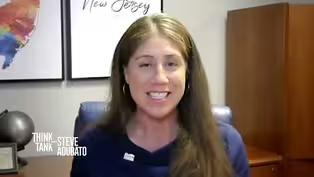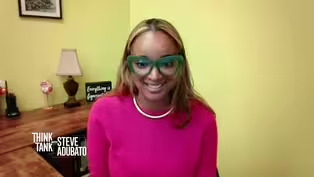
Examining the role of sociology in medical education
Clip: 6/14/2025 | 9m 28sVideo has Closed Captions
Examining the role of sociology in medical education
Steve Adubato sits down with Shawna Hudson, PhD, Senior Associate Dean for Population Health Research at Rutgers Robert Wood Johnson Medical School and Vice Chancellor for Dissemination and Implementation Science at Rutgers Health, to examine the role of sociology in medical education and her research in long-term care of cancer survivors.
Problems playing video? | Closed Captioning Feedback
Problems playing video? | Closed Captioning Feedback
Think Tank with Steve Adubato is a local public television program presented by NJ PBS

Examining the role of sociology in medical education
Clip: 6/14/2025 | 9m 28sVideo has Closed Captions
Steve Adubato sits down with Shawna Hudson, PhD, Senior Associate Dean for Population Health Research at Rutgers Robert Wood Johnson Medical School and Vice Chancellor for Dissemination and Implementation Science at Rutgers Health, to examine the role of sociology in medical education and her research in long-term care of cancer survivors.
Problems playing video? | Closed Captioning Feedback
How to Watch Think Tank with Steve Adubato
Think Tank with Steve Adubato is available to stream on pbs.org and the free PBS App, available on iPhone, Apple TV, Android TV, Android smartphones, Amazon Fire TV, Amazon Fire Tablet, Roku, Samsung Smart TV, and Vizio.
Providing Support for PBS.org
Learn Moreabout PBS online sponsorship- Hi, everyone.
Steve Adubato.
We kick off the program with Dr. Shawna Hudson, who's Senior Associate Dean for Population Health Research at Rutgers Robert Wood Johnson Medical School.
Good to see you, doctor.
- Pleasure to be here, Steve.
- Let's also make clear you're a sociologist, correct?
- Yes, I am a sociologist by training and my faculty appointments in family medicine and community health.
- Yeah, we're gonna talk about that a little bit more.
And also the EJI Excellence in Medicine Awards, which I've been honored to host for many years, and you'll be receiving the Peter W. Rodino Citizenship Award, which is very prestigious.
We'll talk about that in a minute.
But how about this, someone says, what the heck would a sociologist, why are you laughing?
Why would a sociologist be involved in medical school education?
Very important, respond to that, Dr. Hudson.
- Yes.
So people are people first and patients second.
And so we really wanna make sure that when we're addressing the needs of our patients, that we're thinking about them holistically in the context of their families and their communities and the healthcare systems that they're in.
So as a sociologist, I watch, but then I also learn to intervene.
And so a lot of what we do is around trying to help people have better health behaviors and engage in better healthcare seeking in the systems of care that they're in.
So that's why sociologists are actually useful, helpful, and needed within the context of medical education.
- Are you actually engaging medical school students directly as they prepare to become tomorrow's physicians?
This is part of our series about tomorrow's physicians.
I'm gonna try a devil's advocate question.
Someone says either someone has the interpersonal skills, the so-called bedside manner, we're talking about a lot more than that, or they don't, that's not necessarily true, is it?
- It's not.
And actually, so there are a lot of other skills that come in.
So there's the bedside manner piece the you know, we try to teach people how to engage with others, but there are also some important pieces for just being able to understand clinical evidence and information that's out there.
So there are evidence-based guidelines.
We wanna make sure that our medical students are strong connoisseur of the literature that's there, that they can actually discriminate between a good piece of science versus a piece of science that's not necessarily based on the strong merit.
So part of what we do with the training that we have around dissemination and discovery is really to make sure that our students understand how to look at studies, how to better understand what they're saying, and then how to actually engage in guideline care when they're in their settings.
- Dr. Hudson, you've also done extensive research on people who are dealing with cancer.
- Yes - I don't like the term cancer patients, but there are patients who are dealing with cancer and their long-term needs.
Talk about that, cancer survivors.
- Yeah, so I've spent the bulk of my career working with patients in this setting and actually they really are people.
So you have a cancer diagnosis, you go through your treatment.
A lot of people then say either, you know, if they've gotten curative therapy, then hopefully that's the end of their road, but that's really not the end.
It's sort of the beginning of a bunch of other issues that come about because of either their treatments or the cancer.
So we have sort of this lifetime of dealing with different, what we call comorbid conditions, but other chronic diseases that may come about either as a result of treatment or because of the process of aging.
So one of the nice things about this moment in time is that people who have had cancer, and we actually talk about them as individuals who've had a history of cancer, that they really then age for 15, 20 years.
And that's not something that we were seeing back in the '70s.
And so we wanna make sure that that aging process is one that they actually are able to do gracefully and that they live to the fullest extent that they possibly can.
So we want quality of life, not just quantity of life.
- Doctor, how did you become fascinated by this field and the people that are affected and impacted by it?
- So I actually have had, there are many people in my family who have actually been affected by cancer, but when I started this, that was really not sort of the driver.
Subsequent, my mother died of lung cancer.
My father is prostate cancer survivor.
I've had a number of aunts and uncles who have dealt with colorectal cancer and other types of cancer.
And so part of it is personal now, but when I first started it was really looking at how do people navigate the system of care?
And many people, once you have a diagnosis, if you haven't had a strong sort of primary care relationship, that's your first entree into the system.
And so really wanting to make sure that people could figure out how do you best navigate?
And then once you're done with your treatment, where do you go for the best care to continue that quality?
- I was gonna disclose something about a family member who's dealing right now with a cancer diagnosis, but everyone watching, I cannot imagine that everyone watching regardless of what platform you see us on, that there isn't someone in your life who is dealing with cancer at different stages.
And the clinical and the medical component, and I won't get on my soapbox, they're obviously important, but the human aspect of dealing with cancer as a survivor that doctor Hudson's talking about is so important and in that spirit, let me ask you this.
Again, I've been involved in the EJI Excellence in Medicine awards for many years and, and you are the recipient of the Peter W. former late great congressman Peter W. Rodino who was a mentor of mine growing up in Newark and chair of the Watergate Nixon impeachment proceedings in the mid 1970s.
You are receiving the Peter W. Rodino Jr. Citizens Award from the EJI Excellence in Medicine from the team.
What does that mean to you, doctor?
- I have to say that, you know, one of the most important parts of my work is being able to put the patient and the person and the individual voice forward.
And so it's really important to me to get the citizenship award because it means that the work that I'm doing is actually meaningful and it's really putting those people's spaces in the places where we understand that we're dealing with individuals at the end of the day and not just people moving through systems of care.
So really excited to get that award.
- Last question.
This is again, part of our series, Tomorrow's Physicians.
And there'll be many future physicians at that event who receive scholarships.
It's a big part of the event is raising money for scholarships.
Why are you optimistic about the future physicians or physicians of tomorrow?
- So I'm really excited about the future physicians because we are seeing lots of people who are exploring medicine and healthcare fields who have not actually been able to access them in the past.
And so it's really nice to see the reflection of our patient populations really coming through as our students who will then in the future be giving care to the rest of us.
So it's just wonderful to see so many new people, so many first generation and others who are really coming into the field and helping and going back to their communities to continue that work.
- It is incredibly rewarding to be a part of that event, to see those medical students who need these dollars to get through medical school and know that they're going on to make a difference in the field of medicine, healthcare.
And congratulations Dr. Shawna Hudson for receiving the Peter W Rodino Jr. Citizens Award at that event.
Thank you, Dr. Hudson.
- Thank you very much, Steve.
- You got it.
Stay with us, we'll be right back.
- [Narrator] Think Tank with Steve Adubato is a production of the Caucus Educational Corporation.
Funding has been provided by New Jersey Children’s Foundation.
EJI, Excellence in Medicine Awards.
A New Jersey health foundation program.
Congress Hall.
A Cape Resorts property.
PSEG Foundation.
The Fidelco Group.
New Jersey Sharing Network.
Robert Wood Johnson Foundation.
Wells Fargo.
And by The Russell Berrie Foundation.
Promotional support provided by The New Jersey Business & Industry Association.
And by New Jersey Monthly.
- How long you been waiting?
- About a half hour.
- Brutal.
This keeps up, I'm gonna miss my pickleball game.
- I've been waiting eight years for a kidney.
What can you do?
(gentle music) - [Narrator] Over 100,000 people in the US are waiting for a life-saving transplant.
But you can do your part in an instant.
Register as an organ donor today at NJSN.org.
How HESAA is making college more affordable in New Jersey
Video has Closed Captions
Clip: 6/14/2025 | 8m 30s | How HESAA is making college more affordable in New Jersey (8m 30s)
Philips Academy Charter School highlights their initiatives
Video has Closed Captions
Clip: 6/14/2025 | 9m 32s | Philips Academy Charter School highlights their initiatives (9m 32s)
Providing Support for PBS.org
Learn Moreabout PBS online sponsorship
- News and Public Affairs

Top journalists deliver compelling original analysis of the hour's headlines.

- News and Public Affairs

FRONTLINE is investigative journalism that questions, explains and changes our world.












Support for PBS provided by:
Think Tank with Steve Adubato is a local public television program presented by NJ PBS

